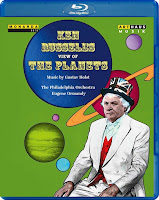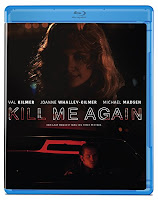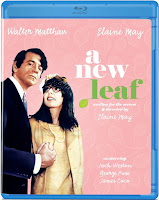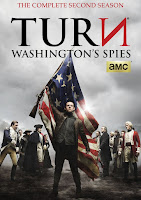the traveler's resource guide to festivals & films
a FestivalTravelNetwork.com site
part of Insider Media llc.
Reviews
April '16 Digital Week I
- Details
- Parent Category: Film and the Arts
- Category: Reviews
- Published on Wednesday, 06 April 2016 03:27
- Written by Kevin Filipski
Banshee—Complete 3rd Season
(HBO)
The third season of this extremely violent but rarely dramatically potent Cinemax series ratchets up the excessive gore at the expense of coherent storytelling and plausible characters: jettisoning anything resembling credibility in order to oversell the next bludgeoning, killing or decapitation is a recipe for becoming less interesting as it continues.
It has stylishness in spades, including its ultra-attractive cast, but then the blood-letting begins again and it loses any dramatic momentum. The hi-def transfer is impeccable; extras include commentaries, deleted scenes and featurettes.
(Arrow USA)
Italian giallo master Luciano Ercoli directed his future wife, actress Nieves Navarro—who went by her stage name Susan Scott—in a pair of bloody thrillers as a clichéd damsel in distress: both 1971's Death Walks in High Heels and 1972's Death Walks at Midnight lean on Scott's winsome personality to follow her through convoluted mysteries that are minimally psychological but maximally trashy.
As always, Arrow has included both films in a classy boxed set that features a 60-page booklet, new hi-def transfers, and interviews, featurettes and introductions/ commentaries.
Cinderella
(Arthaus Musik)
While I've never been a fan of British composer Michael Tippett, his 1962 opera King Priam is strongly dramatic and musically cohesive; based on Homer’s Iliad, it’s a knottily-plotted tale, and Nicholas Hytner's 1985 film (with Rodney McCann as Priam, Sarah Walker as Andromache, Neil Jenkins as Achilles and Anne Mason as Helen of Troy) is a tough, taut interpretation.
Conversely, it’s simply too bad about choreographer Maguy Marin's 1989 production of Cinderella, Sergei Prokofiev's most beguiling ballet: child-like masks and costumes, which may have looked charming onstage, instead come off mildly creepy on TV. Video and audio for both discs are fine.
Losing Ground
(Milestone)
Another valuable addition to Milestone Films' growing library of resurrected historically and artistically important American films and filmmakers, this two-disc set features this astute 1982 character study by provocative writer-director Kathleen Collins (who died six years later at age 46) starring Seret Scott and Bill Gunn as an artistic couple with marital problems: Collins’ genius was for showing her characters as people, not simply as black people.
Also included are The Cruz Brothers and Miss Malloy, the 1980 debut collaboration between Collins and cinematographer Ronald K. Gray, a probing 1982 Collins interview, and new interviews with Scott, Gray and Collins' daughter. The film has been lovingly restored in hi-def.
(Warner Archive)
Liam Neeson's commanding portrait of the Irish independence leader from his political beginnings until his untimely (and mysterious) death in 1922 is the center of Neil Jordan's 1996 biopic, a fluid, exciting drama on a dense, difficult subject. Complementing Neeson is superb support by Stephen Rea, Aidan Quinn, Alan Rickman and Brendan Gleeson, which offsets Julia Roberts' unmagnetic presence (and wavering accent) as Collins' fiancée.
The film's belated but welcome appearance on Blu-ray helps viewers better appreciate Chris Menges' tangy cinematography; extras are an hour-long, illuminating South Bank Show episode about Collins' life and a Jordan interview.
(Anchor Bay)
I don't get the current mania for trying to make Jason Sudekis—who was merely a comic journeyman on Saturday Night Live—a leading man in the movies, but this low-energy character study of a dead pop star's widow rediscovering her importance as muse thanks to a music professor leaves a gaping hole at its center with his casting.
Happily, the widow is played by Rebecca Hall, an actress of rare grace, vulnerability and truthfulness, so all is not lost. Small roles are well-handled by Blythe Danner, Richard Masur, Dianna Agron and Griffin Dunne, helping Hall to fill the Sudekis void. The film looks decent on Blu; extras are making-of and music featurettes.
Brotherly Love
A Fine Pair
(Warner Archive)
Although their films aren't very memorable, two star pairings provide mostly indifferent vehicles with occasionally interesting moments. 1970's unsubtle Brotherly Love, about a man's more-than-familial interest in his sister, stars Peter O'Toole and Susannah York as misfit siblings, and they get more out of the problematic relationship than it deserves.
Similarly, 1968's Fine Pair, set in shabby New York and photogenic Italy, teams Rock Hudson and Claudia Cardinale for a forgettable caper chase picture that promises little but delivers some entertainment thanks to its stars’ presence.
(The Christopher Nupen Films)
Supremely gifted English cellist Jacqueline du Pré stopped performing at age 28 due to her battle with multiple sclerosis, which she sadly lost at age 42, in 1987; the loss to the music world is immeasurable, as this disc of vintage interview clips with contemporaries, friends and loved ones discussing her force of personality, musicianship and happiness (her nickname was Smiley) shows.
We see her performing, especially the Elgar Cello Concerto, which she is most closely associated with, and hear her discuss her own love for music, and the three-plus hours of footage become a riveting portrait of a great and humane artist.
Invisible Scars
(First Run)
The 20-minute short Ron Taylor—which recounts his baseball career, quitting the big leagues at 35 to become a doctor, then returning to baseball in a medical capacity—was made by sons Drew and Matthew as a loving document of their dad's overlooked career.
In Invisible Scars, co-director Johnna Janis opens up about sexual abuse as a youngster and how it affected her ever since: interviews with experts and victims paint a troubled portrait of how people are affected by such a tragedy, but there’s also an optimism that many—including Janis herself—are defiantly taking charge of their own lives. Taylor extras are a directors' interview and film festival Q&As; Scarsextras are extended interviews.
Theater Review—Classic Musical "1776" Returns, via Encores
- Details
- Parent Category: Film and the Arts
- Category: Reviews
- Published on Saturday, 02 April 2016 03:11
- Written by Kevin Filipski
1776
Book by Peter Stone; music & lyrics by Sherman Edwards; directed by Garry Hynes
Performances through April 3, 2016
 |
| The cast of 1776 at Encores! (photo: Joan Marcus) |
Forget Hamilton. 1776 remains the champion of Revolutionary-era American musicals, and the current Encores! semi-staging furthers its case for uniqueness, brilliance and sheer entertainment, all intact since its 1969 Tony-winning production.
Smartly directed by Garry Hynes with appropriate nods to the original director, Peter Hunt (who also helmed the classic film version with original cast members William Daniels, Howard da Silva and Ken Howard), 1776 is buoyed by what is probably the greatest musical book in Broadway history: Peter Stone provides savvy, droll and endlessly quotable dialogue for the Founding Fathers (some of which came directly from them), who come vividly to life as merely flawed men who are, as Ben Franklin sagely notes, "trying to get a nation started against greater odds than a more generous God would have allowed."
But although Stone's book is the show's backbone—indeed, it would also make a wonderful straight play—Sherman Edwards' delightful songs further humanize the men (and women) who played the main roles in founding our country, and hearing his music played by the excellent Encores! Orchestra under conductor Ben Whiteley is a special treat.
Hynes' exceptional cast is led by Santino Fontana (an amusingly pig-headed John Adams), John Laroquette (an endlessly witty Ben Franklin) and John Behlmann (a sober, dashing Thomas Jefferson); if none is up to the level of the original performers, Fontana, for one, sings more powerfully than William Daniels. Nikki Renee Daniels charmingly dispatches Martha Jefferson's pretty paean to her husband, "He Plays the Violin," while Christianne Noll's articulate, funny and golden-voiced Abigail Adams makes a perfect foil to Fontana's John, especially in their glorious duets, "Till Then" and "Yours, Yours, Yours."
Edwards' score contains great songs allowing supporting characters to shine: Bryce Pinkham, as John Dickinson, gives a marvelous reading of that cutting hymn to Conservative values, "Cool Cool Considerate Men"; Alexander Gemignani brings down the house as Edward Rutledge, the Southern slave owner, when he sings "Molasses to Rum," that powerful rebuke to Northern hypocrisy when it comes to the "peculiar institution"; and John-Michael Lyles, as the courier who delivers General Washington's distressing dispatches to Congress, is quite moving in the emotional soldier's ballad "Momma, Look Sharp."
It might have been chosen by Encores! to ride the coattails of Hamilton, but 1776 is, in all respects, the superior show.
1776
New York City Center, 131 West 55th Street, New York, NY
nycitycenter.org
Off-Broadway Reviews—Kenneth Lonergan's 'Hold on to Me Darling' & Richard Nelson's 'Hungry'
- Details
- Parent Category: Film and the Arts
- Category: Reviews
- Published on Thursday, 31 March 2016 15:28
- Written by Kevin Filipski
Hold on to Me Darling
Written by Kenneth Lonergan; directed by Neil Pepe
Performances through April 17, 2016
Hungry
Written and directed by Richard Nelson
Performances through April 3, 2016
Kenneth Lonergan and Richard Nelson write plays which ring true with the messiness of real life, however diffuse or undramatic. Lonergan's unwieldy plays often bump up against melodrama or soap opera, with characters bordering caricature and realistic dialogue that rises to a sort of quotidian poetry that provide a fiery aliveness. Nelson has pared down his writing to the essence of drama: a group of people sitting around, talking about nothing—and everything—for 90 or so minutes, laying bare our shared humanity.
 |
| Adelaide Clemens and Timothy Olyphant in Hold on to Me Darling (photo: Doug Hamilton) |
Lonergan's Hold on to Me Darling begins as a sort-of soap opera parody, as fantastically successful country crossover singer/movie star Strings McCrane struggles with the aftermath of his beloved mother's death: his impulsive decisions—from deciding to marry the lovely (and already married) Nancy, who gave him a massage in his hotel room, to sleeping with his distant cousin Essie after seeing her at the funeral, to quitting show biz to start a feed store with his brother Duke in their Tennessee hometown—mark someone who has never been able to deal with life on its own terms and has instead done what any multi-millionaire celebrity would: think only of himself.
For over two and a half hours, Lonergan allows his protagonist to careen wildly between sanctimony and satire, sometimes in the same scene. The biting dialogue, always Lonergan's strong suit, manages the seemingly impossible task of alternating between realism and ridiculous self-indulgence. But whatever is said, even Strings and Duke's amusing asides like "Jesus Christ in a downtown Memphis hair salon" or "Jesus Christ on the Tour de France," always sounds exactly right for whoever is speaking. Even the final scene, when Lonergan introduces a major character who was mentioned earlier, works handily, even while wearing its heart on its sleeve a bit too sincerely.
As Strings, Timothy Olyphant initially seems to be channeling an Elvis impersonator and Tim Robbins' colorful Nuke Laloosh in the movieBull Durham: but even skating on the thin ice of caricature doesn't derail Oliphant's outsized but fully realized portrait. As the women in Strings' life, Jenn Lyon (Nancy) and Adelaide Clemens (Essie) are sympathetic and touchingly funny, C.J. Wilson makes an hilariously deadpan Duke, Keith Nobbs is amusingly harried as Strings' assistant Jimmy and Jonathan Hogan makes the most of his brief onstage time as Mitch.
The play's eight locations are astonishingly realized on Walter Spangler's brilliant revolving set, while Neil Pepe's direction is acutely in tune with Lonergan's off-kilter but penetrating observations on how persons interact while building or tearing down the walls pervading many relationships.
 |
| The cast of Hungry (photo: Joan Marcus) |
Richard Nelson's Hungry begins a new cycle, The Gabriels: Election Year in the Life of One Family. On the heels of his Apple Family Plays, an extraordinary quartet of dramas that looked at one family, the new group of plays—of which Hungry is the first—can't hope to live up to such a high standard.
And indeed, though it is intelligent, humane and beautifully acted,Hungry marks a major playwright treading water, returning to a well that seems to be drying up. The Gabriel family of Rhinebeck, NY (where playwright Nelson lives) has gotten together after a memorial service for Thomas, famous writer and brother of George and Joyce, both visiting his home where his widowed third wife Mary lives. George's wife Hannah and Thomas's first wife Karin have also joined them, as well as their elderly mother Patricia.
Nelson's observations are personal and often poignant, the brief discussion of politics is trenchant, and there is enough naturally arising humor to gloss over his creaky central conceit: that the entire 100-minute play takes place at the kitchen table with the women making dinner and dessert while discussing things both mundane and serious, including various states of hunger.
But Nelson remains an economical writer and director, and his ensemble—Meg Gibson, Lynn Hawley, Roberta Maxwell, Maryann Plunkett, Jay O. Sanders and Amy Warren—is as unbeatable as the one in the earlier plays. (Sanders and Plunkett are the sole holdovers.) So, although Hungry leaves us hungry for more, I look forward to sampling the next two installments.
Hold on to Me, Darling
Atlantic Theater, 320 West 20th Street, Brooklyn, NY
atlantictheater.org
Hungry
Public Theater, 425 Lafayette Street, New York, NY
publictheater.org
March '16 Digital Week V
- Details
- Parent Category: Film and the Arts
- Category: Reviews
- Published on Tuesday, 29 March 2016 23:11
- Written by Kevin Filipski
Blu-rays of the Week
Bicycle Thieves
(Criterion)
Vittorio De Sica's classic—one of those films appearing in all-time greatest polls, as well as being part of any Cinema 101 class—remains an emotionally devastating journey that, along with De Sica's own Shoeshine and Robert Rossellini's Rome Open City, introduced the world to Italian neo-realism.
Made in 1948 with amateur performers on the streets of post-war Rome, the film continuously flirts with soap opera but never succumbs; Criterion's new Blu-ray includes a flawless hi-def transfer and the usual illuminating extras: interviews, neo-realism featurette and 2003 documentary on screenwriter Cesare Zavattini.
Ken Russell's View of The Planets
(Arthaus Musik)
Two idiosyncratic directors provide their unique takes on two musical masters in two highly personal films. Werner Herzog's 1995 Gesualdo recounts the murderous life of a 16th century Italian composer; although more straightforward than usual, the grim material is weighty and bizarre enough to keep Herzog busy for an hour.
In 1983, Ken Russell made his own full-length video, with found footage, of Gustav Holst's The Planets; although coming perilously close to self-parody—shots of Hitler and the Nazis are out of Russell's usual playbook—the editing and sequencing of shots is a singular Russell fingerprint. Both films look soft on Blu; although the box lists it, Gesualdo does not include a bilingual Herzog commentary.
(Anchor Bay/Weinstein Co)
Quentin Tarantino takes such pride in his movie knowledge that his extensive thievery from other, better films is given a pass by many who should know better: unsurprisingly, his latest self-indulgent mess might be his most obnoxious movie yet. For nearly three hours, an octet of annoying characters gets together and, unsurprisingly from the horrible title, proceed to one-up one another.
When not showing a weirdly enervating fantasy about a well-endowed black man, Tarantino gratuitously revels in geysers of blood and (of course) the N-word. Robert Richardson's 70mm cinematography is wasted on the static, interior-bound story, because of which the perfectly adequate hi-def transfer suffers. Extras comprise two featurettes.
(Olive Films)
In John Dahl's disappointing 1989 film noir, then-new off-screen couple of Val Kilmer and wife Joanne Whalley Kilmer are mired in a ridiculously overwrought plot that provides a few scattered moments of tense drama amid routine, recycled moments from better crime dramas.
Dahl directs stylishly, and there's a nicely creepy turn by Michael Madsen as the bad guy, but Kilmer and Whalley-Kilmer—at sea throughout—end up dragging the whole movie down. The Blu-ray transfer is quite good.
(Olive Films)
Elaine May, who wrote and directed this 1971 black comedy before moving onto Mikey and Nicky (1976) and, more infamously, Ishtar (1987), plays a lonely heiress who marries financially ruined playboy Walter Matthau, after which he tries to get rid of her in any way possible.
May's scattershot script has amusing episodes alongside strained ones, and as director she glosses over some good ideas to inexplicably concentrate on lesser ones. But it has a freshness and daring that hasn’t dated, and both leads are in top form. The movie looks good and grainy on Blu.
(Magnolia)
For those unaware (like me), Noma is a Copenhagen restaurant chosen best in the world several years running, and Pierre Deschamps' portrait of Noma chef Rene Redzepi is sharp and focused, even lucky: when a norovirus fells several diners at the restaurant, cameras record Redzepi and his associates' incredulous, bemused reactions.
Redzepi is forcefully foul-mouthed but engaging, and his unique spin on Nordic cuisine leads to beautifully photographed glimpses of his delectable dishes. The film and the food look splendid on Blu; extras include deleted scenes.
(Warner Bros)
In this unnecessary remake of the vapid 1991 Kathryn Bigelow film, an FBI agent and extreme-sports athlete goes up against the ultimate daredevil villain in a movie almost fully bereft of human interaction, instead becoming an excuse for an unending series of excellent stunt sequences awkwardly staged by director Ericson Core.
The astonishing stunt work and photography notwithstanding, most of the movie’s two-hour running time has little in the way of interesting plotting, dialogue and acting. The film looks great on Blu; extras include behind-the- scenes featurettes and deleted scenes.
Killing Them Safely
(Sundance Selects)
The history of the Taser—which quickly entered law enforcement annals as a most effective weapon—is skeptically recounted by director Nick Berardini, who looks at the many incidents of related fatalities when otherwise healthy people died after encountering Taser-wielding cops.
Although the jury's still out on causality, such incidents bring into question the Taser’s efficiency and safety, and despite claims to the contrary by interested parties, even law enforcement officials are starting to gainsay its usefulness.
(Sundance Selects)
In this sympathetic portrait of Europe’s immigrant crisis, Italian director Jonas Carpignano shoots his gaze at a laborer from Burkina Faso who arrives in Italy prepared to work and send money back to his wife and young daughter: he soon finds that the hard part was not leaving and making the journey to a new country; instead, there is no shortage of difficulties for him and others in their adopted home.
Carpignano takes the measure of his protagonist with intelligence, grace, and not a little humor, ending on a sad but telling incident between our hero and his family back home.
(Anchor Bay)
The second season of Turn continues to chronicle the dangerous adventures of spies who did much of the dirty work for General Washington during fraught times for the ragtag Continental Army against the more imposing, better-trained British troops.
The year is 1777, and events including the horrible winter at Valley Forge and the first arrival of French troops to fight with the colonial army are persuasively dramatized, and the presence of someone named Benedict Arnold portends much traitorous behavior to come. Extras are deleted scenes, extended scenes and featurettes.
More Articles...
Newsletter Sign Up

Upcoming Events
No Calendar Events Found or Calendar not set to Public.

























